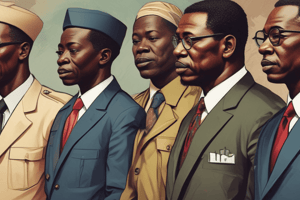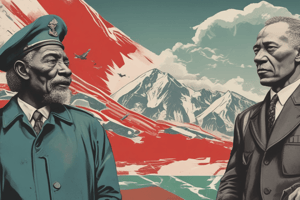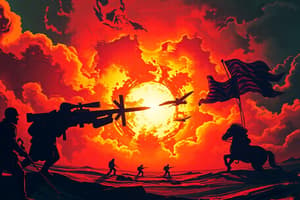Podcast
Questions and Answers
How was Africa drawn into the Cold War?
How was Africa drawn into the Cold War?
The US and USSR sought to influence newly independent African nations to adopt governments aligned with their ideologies, using aid, military intervention, and competition for resources.
Which events contributed to external powers competing in Africa?
Which events contributed to external powers competing in Africa?
- Scientific cooperation
- Aid and trade alliances (correct)
- Military confrontation
- Cultural exchange
Angola was economically thriving prior to the Angolan War of Independence.
Angola was economically thriving prior to the Angolan War of Independence.
True (A)
What resources made Angola an attractive sphere of influence for superpowers?
What resources made Angola an attractive sphere of influence for superpowers?
What major impact did the slave trade have on Angola's population?
What major impact did the slave trade have on Angola's population?
The Portuguese Colony of Angola was established at ___.
The Portuguese Colony of Angola was established at ___.
Portugal abolished the slave trade before it heavily involved in it.
Portugal abolished the slave trade before it heavily involved in it.
What was the outcome for many African kingdoms due to the slave trade by 1605?
What was the outcome for many African kingdoms due to the slave trade by 1605?
Flashcards are hidden until you start studying
Study Notes
The Cold War in Africa
- The Cold War between the USA and USSR influenced Africa's independence movements.
- US foreign policy focused on preventing Soviet influence in new African states.
- Both the US and USSR provided aid to African countries, often tied to political alignment.
- The USSR promoted communism as a non-imperialist alternative.
Neo-colonialism in Africa
- Superpowers competed for access to Africa's natural resources (minerals, oil, and agricultural products).
- Newly independent African countries remained economically dependent on these resources, a condition known as neo-colonialism.
- Superpowers invested in and provided aid to African nations to advance their respective ideologies.
Angola in the Cold War
- Angola, rich in resources, attracted the interest of superpowers and their allies.
- During the Angolan War of Independence (1961-1975), various liberation movements competed for power.
- The Cold War influenced these conflicts, with superpowers providing funding and aid to various liberation movements.
Colonial Legacy in Angola
- The Portuguese established a colony in Angola in 1576, initially focusing on slave trade.
- By 1650, Angola became a major supplier of slaves for Brazilian plantations.
- The slave trade had a devastating impact on Angola's population and economy.
- After the abolition of slavery, the colonial economy shifted towards export crops like cotton, corn, coffee, and sisal, with forced African labor.
Studying That Suits You
Use AI to generate personalized quizzes and flashcards to suit your learning preferences.




